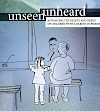Children of Prisoners
Children and families coping with imprisonment are often described as the ‘hidden’ victims of the penal system because they must endure their own sentence, despite not having perpetrated any crime. There are a variety of ways in which children and families can be affected by imprisonment including: disruption to child care arrangements, relationship breakdowns, financial loss and stigmatisation.
IPRT works towards the recognition and support of the rights and needs of children and families affected by imprisonment through research, advocacy, and awareness-raising activities. This includes an exciting three-year project (commenced in mid-2020) on families of prisoners, aiming to reduce harm for children and families affected by imprisonment, with a particular focus on reducing female imprisonment. We’re very grateful to our funders, Katharine Howard Foundation and St Stephen’s Green Trust, for supporting such a timely piece of work. You can read more about the network of organisations working in the area set up under the project on actionforfamilies.ie.
Please note this section contains information about advocacy and developments, both national and international. Practical information for prisoners and their families is available here.
‘Reopening prisons’: Easing of COVID-19 restriction measures
22nd June 2020
IPRT has gathered examples of prison administrations internationally who have eased or who are beginning to ease their COVID-19 restriction measures relating to in-person visiting.
COPE webinar: ‘Keeping children connected to a parent in prison in the COVID-19 crisis and beyond’
27th May 2020
This Children of Prisoners Europe (COPE) webinar featured a series of insightful presentations, subsequent questions and discussion about the challenges that the pandemic presents for prisons, and in particular for prisoners and their families.
New project: IPRT Children and Families Initiative
21st May 2020
IPRT is excited to announce that we are embarking on a new three-year project on families of prisoners, aiming to reduce harm for children and families affected by imprisonment, with a particular focus...
UK: Crest publishes ‘Children of Prisoners: Fixing a broken system’
19th March 2019
A new report by Crest (UK) indicates that revised estimates on the number of children impacted by parental imprisonment are over 50% higher than figures previously used.

Principles of Action for Children with a Parent in Prison: Document Launch
6th September 2017
This ‘Principles of Action for Children with a Parent in Prison’ document is based on a project initiative undertaken by Dr. Fiona Donson, Dr. Aisling Parkes, School of Law, University College Cork, the Children’s Rights Alliance and IPRT.
UK Report (2017) highlights ‘family ties at the heart of prison reform.’
10th August 2017
Lord Farmer’s report (2017) The Importance of Strengthening Prisoners' Family Ties to Prevent Reoffending and Reduce Intergenerational Crime was undertaken in collaboration with the charity Clinks and commissioned by the UK government. The report aimed to establish a link between a prisoner’s relationship with family and a reduction in reoffending. The report was part of the government’s strategy to overhaul prison policy, and according to Lord Farmer it is intended to be one of the biggest overhauls in a generation. The report was commissioned to act as a point of reference for the Secretary of State as he “rolls out the wider reform programme”.
National Advocacy Strategy for Children with a Parent in Prison
6th July 2017
IPRT is collaborating with University College Cork and the Children’s Rights Alliance, in a project which has the overall aim of developing a National Advocacy Strategy for children with a parent in prison.
Scotland: Families Outside Report on National Framework for Prison Visitors’ Centres in Scotland
19th June 2017
Families Outside have recently published their report on the National Performance Framework for Prison Visitors’ Centres in Scotland. In 2015 the Scottish Government announced that it would be providing £1.8 million over a three-year period to assist the work of Prison Visitor Centres. Any Prison Visitor Centre seeking funding from the Scottish Government will now be required to demonstrate that they can meet the standards set out in this National Performance Framework.
Children of Prisoners Europe's (COPE) 2017 Campaign “Not My Crime, Still My Sentence”
2nd June 2017
On a given day, 800,000 children in the European Union alone have an imprisoned parent. Read here about COPE's annual cross-European campaign entitled ‘Not My Crime, Still My Sentence’ running throughout the month of June.
UK: I-HOP ‘Supporting children and families affected by a family member’s offending – A Practitioner’s Guide’
28th February 2017
This guide aims to enable practitioners to support children affected by a family member’s offending, with a whole-family approach.




